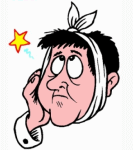
Teething Pain
Teething pain is the pain caused by the eruption of the baby's primary teeth through the gums. Managing teething pain can be a difficult challenge for parents, especially due to the effects of teething pain to the baby’s behavior and sleep patterns. It is also important to not confuse teething symptoms with those of other health conditions.
When to expect teething pain?
Teething starts sometime between 3 to 12 months of age and may last up to the completion of the 3rd year. In some cases the eruption of baby teeth does not cause any significant pain and the baby may hardly seem to notice the change. Problems start if the teething pain is strong enough to disturb the child’s mood and sleeping habits. This could mean a long period of trouble for both the baby and the parents.
Primary teeth start to form from the 6th week in the mother’s uterus (tooth buds). By the time a baby is born the crowns of the front teeth, which are usually the first to erupt, are already formed but they are still under the gums. After birth, the growing teeth buds start to move towards the gums. At about 6th month after birth the front teeth start to push the gums. The cells in the gum tissue above the tooth begin to break down, which helps the baby tooth to slide through. The pressure that baby teeth apply to the gums before they are able to cut through them is what causes most of the teething pain.
Teething pain symptoms
Symptoms of teething pain may vary from child to child. Some may not experience any pain or at least do not give any signs of it, while in others a variety of symptoms may indicate that they suffer from teething pain.
Teething pain symptoms are more intense during the eruption of the very first teeth (before the baby gets accustomed to the sensation of teething pain), and later when the molars erupt (due to their larger size). Babies can not talk and tell us that they are in pain, so parents must be able to notice other signs that may indicate their baby is experiencing teething pain. These include several physical or behavioral symptoms:
- Red tender gums – swelling. The gums feel tender and become red and swollen or even bruised, on the spot where a tooth is about to break through. Some bleeding may also occur when the gums are cut by the tooth but it is rare.
- Drooling more than normal.
- Urge to bite on objects. Babies with teething pain start to bite and chew everything they get in their hands. The pressure of biting seems to comfort the pain by equalizing the pressure of the erupting tooth to the inner side of the gums.
- Bad mood. Crankiness, anxiety, increased crying and general irritability of the baby are common symptoms of teething pain.
- Difficulty to sleep at night. During the day other activities help the baby to be distracted from the pain, but the lack of distractions during the night may make the pain more noticeable.
- Loss of appetite. Baby refuses to eat due to the pain.
- Rash around the mouth, as the skin is irritated by the saliva due to drooling.
Fever and diarrhea have also been reported as teething pain symptoms, however there is a strong debate on whether they should be related to teeth eruption or not. The risk is that attributing them to teething when they may be signs of more serious illness may have critical health implications.
- Diarrhea. Increased drooling and swallowing large quantities of saliva may cause some loose stools in the diaper. But diarrhea should not be considered as a regular symptom of teething.
- Fever. Although low grade fever has been reported as a possible symptom of teething babies caused by gum inflammation, it is advisable not to consider any fever as normal and to contact your pediatrician for consultation. Temperature over 101°F should never be ignored based on teething.
Ear infection pain may also have similar symptoms with teething. The main difference between teething pain and ear infection pain is that teething pain seems to diminish at times while pain from ear infection worsens and it is accompanied by fever.
How to manage baby teething pain?
If your child has been suffering from teething pain, the following methods can provide some relief:
- Massage gently the baby’s gums with your finger or a cold wet washcloth.
- Give your baby a wet washcloth or other smooth objects to chew on. The soothing effect can be better if they are cold (not frozen because they can cause frostbites). Keep small objects out of reach to prevent choking.
- Teething rings are used to satisfy the need of the baby to chew on something. They are quite effective in easing teething pain because putting pressure on gums from the outside equalizes the pressure exerted by the rising tooth and numbs the pain. This also helps the break down of the gum tissue above the erupting tooth.
- Be supportive to your baby and avoid showing anxiety. A baby in stress will only worsen the problem.
- Avoid giving your baby teething biscuits or other hard foods which may contain lots of sugar, as they increase the danger of developing tooth decay.
- Teething tablets or painkillers such as Acetaminophen can be recommended by the dentist or pediatrician in case of severe discomfort in order to relieve teething pain.
- Over the counter teething gels such as Orajel and Anbesol which contain topical numbing agents can provide teething pain relief but should not be overused. Always ask your pediatrician’s advice before you give your baby any medication for teething pain.

 Dental Insurance
Dental Insurance Toothache Medicines
Toothache Medicines